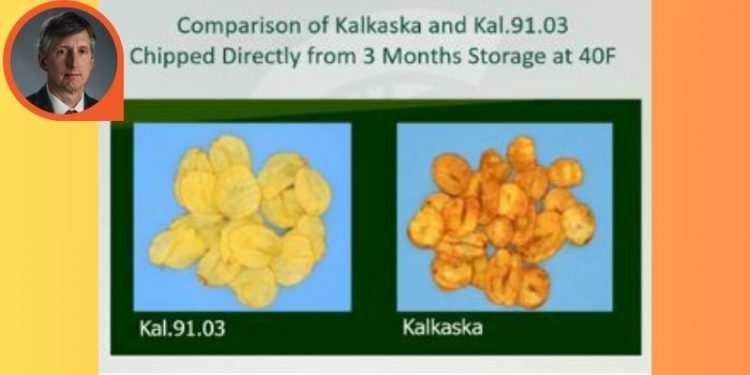USDA APHIS Paves the Way for New Genetically Engineered Potato
Potato enthusiasts and agricultural stakeholders are celebrating a breakthrough in potato biotechnology as the U.S. Department of Agriculture’s Animal and Plant Health Inspection Service (USDA APHIS) grants a significant exemption. This exemption applies to the genetically modified Kal91.3 potato developed by David Douches, a pioneering potato breeder at Michigan State University (MSU).
The Kal91.3 potato, originating from the Kalkaska variety, represents a leap forward in potato storage technology. Unlike conventional potatoes, it exhibits extended cold storage capabilities without the typical sucrose accumulation that leads to off-color browning and caramelization. This attribute promises to enhance the quality and desirability of potato-based products, including beloved favorites like potato chips.
In addition to its culinary advantages, the Kal91.3 potato offers environmental benefits by reducing the need for pesticides and fertilizers during cultivation and storage. This trait is attributed to the potato’s modified genetic makeup, which addresses sugar imbalance issues encountered in some commercial potato varieties.
According to MSU’s recent press release, the breakthrough involved silencing the vacuolar acid invertase enzyme responsible for sucrose breakdown in potatoes. This genetic modification stabilizes sugar levels within the potato during storage, even at lower temperatures, thus minimizing quality degradation and improving shelf life.
David Douches, director of the MSU Potato Breeding and Genetics Program, expressed optimism about leveraging biotechnology to enhance potato traits critical for commercial success. He emphasized that while traditional breeding poses challenges, biotechnological interventions like RNA interference (RNAi) have streamlined the enhancement process for specific traits like sugar metabolism.
The USDA APHIS exemption, received in January 2024, underscores the regulatory acceptance and safety of the Kal91.3 potato. Authorities determined that its development did not pose greater risks compared to conventionally bred varieties, aligning it with non-regulated status akin to traditional breeding practices.
This milestone not only signifies a technological advancement in potato cultivation but also opens avenues for future innovations in agricultural biotechnology. Stakeholders are optimistic about the broader implications of this breakthrough on global potato markets and sustainable farming practices.







